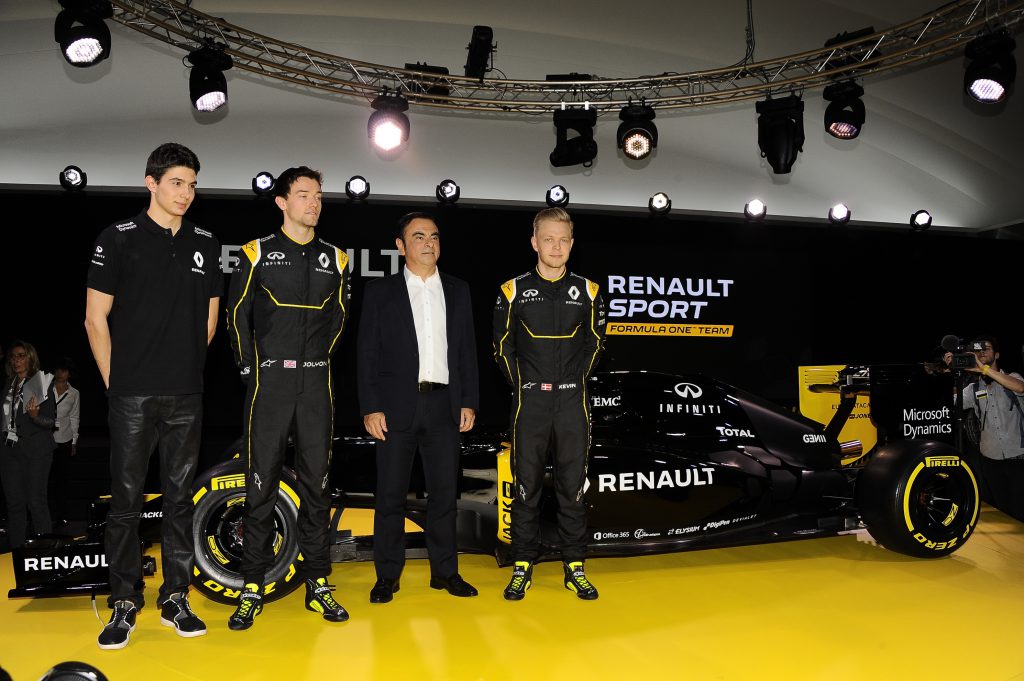
There were a few raised eyebrows when Jolyon Palmer (North 2009) was named as Lotus’ replacement for Roman Grosjean at the end of the 2016 Formula One season. Although he had won the 2014 GP2 title and impressed in F1 testing, he was not a household name and did not feature much in paddock talk surrounding likely candidates for vacant seats.
There were still a few wobbles. Lotus was a team in crisis and it was only when the take-over by Renault was confirmed that Palmer’s drive was secure. Even then he found that he had a new team-mate. When he signed he was going to partner the accident-prone Pastor Maldonado, but as Venezuela’s economy tanked Maldonado’s sponsorship dried up and, unable to fund his race seat, he in turn was replaced by former McLaren driver Kevin Magnussen.
At 25, Palmer is a year younger than his father, Jonathan, was when he made his F1 debut at the 1983 European Grand Prix but he is hardly a youngster. Lining up alongside him will be Max Verstappen, who was 17 when he started first grand prix in 2015, as well as be six other younger drivers, including Magnussen.
Palmer senior is optimistic. “Jolyon is coming in at a good time,” he told The Guardian. “F1 is not just about being quick. It’s about being experienced, confident and mature, and making the right judgments. Jolyon’s a fearsome racer. His race craft is outstanding, in terms of overtaking. He rarely makes a mistake. But his great strength is his outstanding ability to read a race and think of the strategy. He’s strategically very strong.
“In GP2 he was forceful on contributing to and sometimes insisting on strategy, and he was normally right. In his GP2 commentary he showed that he could see what was going on in a race. And driving he has the peripheral awareness to know what’s happening around him. He has a good gut feeling. To be able to drive with seven tenths of mental capacity, so you have another three tenths over, is very important.”
But Jolyon Palmer is quick to describe suggestions he owes his place to his father as “grossly unfair”, adding: “I know how hard it’s been to get here. Some drivers who have had more successful F1 racing dads than mine haven’t made it. And they’ve been trying. F1 teams don’t just take you because of your name. In my career I’ve never thought of myself as the son of Jonathan. Other people thought that, of course.”
He started racing karts at the age of 13, which made him a late starter when compared with many other drivers, before progressing into T Cars and then moved to Formula Palmer Audi (2007-08). He then went into Formula Two, but his breakthrough season was his third in GP2 two years ago. He won the championship with three races to spare and scored a record number of points in the series.
That put him on the periphery of F1. A brief flirtation with Force India came to nothing, and then the struggling Lotus stepped in. He tested for them but there did not seem a chance of a race seat until Grosjean, concerned by the team’s problems, moved to Haas.
“We were struggling to turn up at the track,” Palmer said of the last few races of 2015. “A lot of stuff turned up late. We had a tyre issue in Budapest. But Japan was the worst. It was back to back with Singapore. So everyone got there early. But it was clear on Tuesday there would be issues and on Wednesday a lot of freight hadn’t turned up. It was really wet and we had no hospitality. But we always managed to get both cars out there.”
His perseverance was rewarded, and Renault’s takeover in December resolved the financial issues but still came very late for the current season. “This will be a rebuilding year, a grounding year. It’s the start of a long-term project.”
Nonetheless, he is enthusiastic about what is in store. “I’m looking forward to going toe-to-toe with the best drivers in the world. My strength has always been going wheel-to-wheel, which is always my favourite piece of racing. That’s what I missed in the test driving last year. I can’t wait to get started because the winter has been long.”
While many of those who will line up on the grid with him in Australia on March 20 live in tax havens such as Monaco, Palmer’s base remains in England. “I don’t want to escape. Living in Oxford would be easier for the team but I enjoy being in Clapham, and I’ll be staying for the foreseeable future.”
Palmer’s father knows that amid all the excitement of his son’s F1 debut, he has to make an immediate impression. “If you don’t make the best of the opportunity you’re going to get spat out very quickly. He’s got to make an impact this year. Getting results is the bottom line. It’s important he does justice to the car and furthers his reputation for future years. But he’s confident and relaxed, not cocky but not overawed either.”

